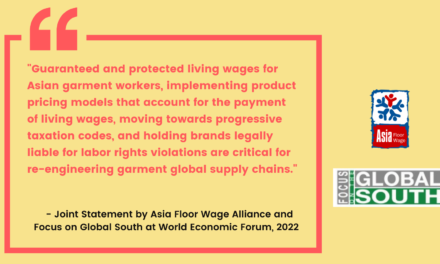For Immediate release
“Special Economic Zones (SEZs) and Value Extraction from the Mekong: A Case Study on the Control and Exploitation of Land and Labour in Cambodia and Myanmar SEZs”
Co-organized by: Paung Ku, Dawei Development Association (DDA), Tavoyan Women’s Union (TWU), Myanmar SEZs’Watch, EarthRights International – Myanmar (ERI), and Focus on the Global South (Focus). Supported by Rosa Luxemburg Stiftung Southeast Asia.
Friday 20 October 2017, Yangon, Myanmar – “Special Economic Zones (SEZs) and Value Extraction from the Mekong: A Case Study on the Control and Exploitation of Land and Labour in Cambodia and Myanmar SEZs,” includes studies of special economic zones in Cambodia and Myanmar, especially of the incentives and assurances offered to investors weighed against the protection and benefits to local communities, workers, and the environment.
The report is the result of a year long process, where a scoping study was conducted to guide the study. The study is based on desk reviews of existing literature, and interviews with government officials, investors, garment manufacturer association representatives, bank representatives, a National Human Rights Commissioner, NGOs working on SEZs and investment, and representatives from unions and labour organizations.
Summary of the report[1]
Special Economic Zones (SEZs) have been built worldwide since the 1960s to facilitate global free trade and integrate developing countries into global production and distribution networks, and have been mushrooming in Southeast Asia in recent years. They remain controversial, and are attracting growing interest from policy makers, investors, civil society, and the general public. Supporters praise them for spurring foreign investment, creating jobs, building infrastructure, and helping host countries to diversify their economies; critics argue that they entail more costs than benefits, negatively impact local communities, undermine workers’ rights, and cause environmental harm and degradation.
The study finds that SEZs have played a central role in the Greater Mekong Subregion Economic Cooperation Scheme (GMS-ECP) since the mid-1990s, a regional integration and development model of the Asian Development Bank (ADB); and are being integrated into China’s One Belt, One Road initiative. Although generous enticements and guarantees are offered to investors, similar commitments have not been extended to locals. While national and international laws and standards pertaining to land, labour rights, and environmental protection officially apply to SEZs, they have not been implemented effectively. SEZs have been developed with limited transparency and locals have been displaced without proper consultation and adequate redress. Workers face obstacles protecting rights they are entitled to under domestic and international law, and have been violently supressed for asserting them. Environmental impact assessments have not always met international standards, and environmental regulations have been enforced selectively in some zones.
The study concludes that the legislative and governance structures covering the development and operation of SEZs have been skewed toward the interests of investors and against those of locals and the environment. It contends that SEZs have been used as tools enabling investors to capture and exploit Cambodia and Myanmar’s most productive assets, their land and labour, and are facilitating the financial extraction of value from the Mekong. It also suggests that weaknesses in SEZ governance structures, and the lack of transparency and accountability in the development and administration of the zones, are heightening the risk of capture of the state by political and economic elites: whereby public power may be exercised for private gain, and preferential treatment for certain individuals or firms is woven into the institutional framework of a state.
According to Shalmali Guttal, an executive director of Focus on the Global South, “SEZs have been in existence globally for more than two decades and there is plenty of evidence to show their impacts on the rights of workers and local communities. Also, the model of growth and development that SEZs advance have huge climate footprints. It is alarming that the interests of investors continue to be protected at the cost of people and the environment. Economic growth cannot continue to be promoted without a proper assessment of costs and benefits.”
“The first impact of SEZ faced by the community is the loss of land as well as their livelihoods. Democratic Governments need to carefully examine the long term impact of big investment projects on peace building, social justice and federal union” Kyaw Thu, the executive director of Paung Ku.
“Without right process, such a mega investment project cannot contribute positive impact and it will create more conflicts in our area. We are very worry that the local government will go ahead without listening to peoples’ concerns, particularly women.” Su Su of Tavoyan Women’s Union.
Report’s Recommendations
- SEZ legislative and governance framework be revised to mediate interests of investors and locals more sustainably and fairly;
- Governments reduce their reliance on foreign investments in land and labour intensive industries, and instead invest in local industries and public infrastructure;
- Governments meet international standards of transparency and accountability in SEZ investment and governance arrangements to mitigate the threat of capture of the state and minimize further financial extraction of value from the region;
- Civil society continue to work with communities affected by SEZs and engage with public officials and the private sector, as well as holding misfeasors to account. Civil society could also develop new strategies to deal with more recalcitrant stakeholders, to contribute to a more equitable and liveable region for its inhabitants.
###
Media contact:
Zin Mar Win (Susan), Paung Ku – Myanmar Tel: 092 013 002 | Email: [email protected] Bo Bo, Earth Right – Myanmar Tel: 092 5026 7025 |Email: [email protected] Sophea Chrek, Focus on the Global South Tel: 097 8828 6847 | Email: [email protected]
[1] SEZs and Value Extraction in the Mekong: A Case Study on the Control and Exploitation of Land and Labour in Cambodia and Myanmar Special Economic Zones (SEZs), Charlie Thame. Focus on the Global South, July 2017









